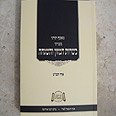
Book cover
צילום: מוטי ריזל, מאיר דהאן
Do bacteria require kosher permit?
How does kashrut system deal with gourmet cheese filled with germs, flavorings and different stabilizing materials? New book discusses religious way of dealing with 21st century's food industry
According to a mythological Bnei Brak fable, the city's Chief Rabbi Moshe Yehuda Leib Landa is one of the few people in the entire world who have been exposed to Coca Cola's secret recipe. Otherwise, he would not have been able to grant a kosher seal of approval to the popular drink produced in the city of Torah and Hasidism.
A new book published ahead of the Passover holiday does not reveal the secret formula worth millions, but its authors – who are experts in the field of kashrut – definitely reveal a number of dark secrets about the food industry.
One of the most sensational discoveries made in the book – published by the Rabbinical Centre of Europe and edited by Rabbi Asher Gold – is provided by Rabbi Mordechai Sofer, head of Rabbi Landa's kashrut system.
As part of the halachic discussions, one of Rabbi Sofer's revelations is that most soft drinks claiming to have "pieces of fruit" do not really contain them. The "deceit" is made possible by mixing stabilizing substances which cause the absorption of particles from the drink and adopt its color – a problematic process requiring special kashrut supervision, which is discussed in detail in the book.
Rabbi Sofer also reveals that many companies color white beans in additional layer of white for a fresher look, and there are those who cover apples with wax in order to make their color look "livelier".
As a rule, the rabbi says, one should not rely on the list of components provided with each product in order to determine whether it's kosher or not, as general definitions like "flavorings" and "stabilizing materials" often conceal components which are "completely unfit for eating" according to Jewish Law.
Fruit juice defined as "100% natural" is not necessarily kosher as well, although the fruit itself is fit for eating, as the filters separating the juice from the fiber and seeds are used many times to filter non-kosher foods, and the residue blends into it. The book also claims that many companies add water to these juices, so that in any event it is not "100% natural".
Is a kosher seal of approval needed for bacteria? Definitely. According to the book, in the United States there is a "bank" with 80,000 germs for food production, used mainly as a culture for different products such as cheese. Most are not kosher as they are stored inside the blood of cows which have not been slaughtered according to Jewish religious laws. The solution: In Indonesia there is a wide production of bacteria preserved in different, kosher conditions.
Rabbi Aryeh Goldberg, deputy director of the Rabbinical Centre of Europe, notes that the book is unique as it is appeals to the entire public and not just to the small community of people involved and specializing in kashrut issues.
"If in the past kashrut issues were the reserve of experts and elected people, today we see increasing public interest from many people seeking to get involved and be updated on kashrut issues."










